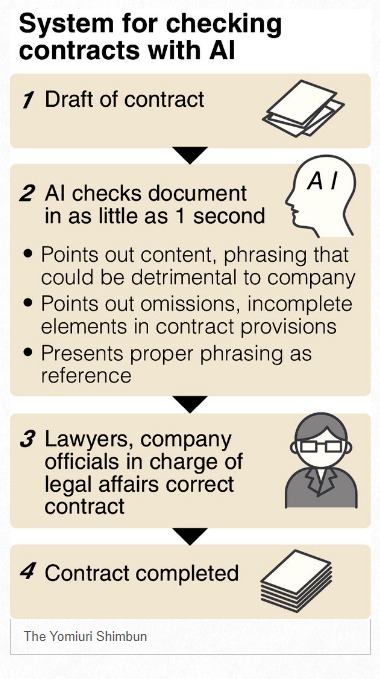
TOKYO — Artificial intelligence has moved into the world of corporate legal matters: A Tokyo-based start-up founded by young lawyers is using AI to check for omissions and mistakes in contracts, sometimes taking only one second.
There have been calls lately for greater legal compliance, and the service is drawing attention over whether it can help streamline corporate legal practices.
LegalForce Inc. was established in April last year, and is led by 31-year-old lawyer Nozomu Tsunoda, who quit a leading law firm to go into business for himself. Even with only seven employees, LegalForce checks contract documents such as a confidentiality agreement between companies.
The service uses AI to automatically check such things as provisions or phrasing that could be detrimental to a company, as well as omissions or incomplete elements. If there are points that need to be corrected or revised, the AI provides correct phrasing as a reference.
Lawyers and company officials in charge of legal affairs ultimately go through the document and make necessary changes.
About 10 companies have so far used the service on a trial basis, including Dentsu Inc., Kao Corp. and Sojitz Corp. Kyoto University’s Academic Center for Computing and Media Studies provided technical assistance. A technology called “natural language processing” has been applied, whereby a computer processes the language used in people’s daily conversation.
This kind of screening has normally been done by lawyers with technical knowledge, or a person in charge of legal affairs within a company, who check every word of a document.
Business contracts regarding such matters as mergers and acquisitions, or joint development projects, can be more than 100 pages long. According to LegalForce, AI has made it possible to shorten the time required for screening, document preparation and other tasks to about one-third the usual time.
Only a limited number of people with expert knowledge work in the field of corporate legal affairs, so companies’ legal affairs departments and the lawyers in charge are usually extremely busy.
“By using AI, we’ll be freed from labor-intensive work that requires knowledge and experience, and instead be able to spend more time on sophisticated judgement and thinking,” Tsunoda stressed regarding the effectiveness of the service.
Using things like information technology and AI in the legal business is called legal tech. Many start-ups have been established in the litigious United States, with the related market estimated at ¥1.8 trillion.
In Britain, technology has been developed to predict court rulings with high probability. According to research by the University of Oxford and other groups, paralegals — people who provide support to lawyers — are believed to be a vanishing profession that could be replaced with AI and robots in the future.